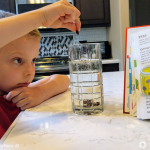
Homeschool families often end up choosing the homeschool lifestyle because they enjoy the freedom to make their own educational choices. They shun following a set of standardized guidelines about what each and every school day ought to include. Along the way, each homeschool family designates some aspects of school as extras and others as priorities.
Sometimes the extras starts to fall off the table as you settle into a routine that covers all the core classes and still allows your family to meet its outside commitments. This is a normal phenomenon and nothing to be alarmed over. However, I am making a plea not to drop all extras from your homeschool schedule...or at least not to drop them all the time.
Homeschoolers are nothing if not flexible. But in the midst of busy-yet-routine homeschool days, we sometimes forget that activities we consider extra can be some of the most memorable and impactful aspects of our homeschool years. They are worth making time for!
Here are a four homeschool activities, commonly deemed extras, along with reasons why not to skip them.
1. Science Experiments
I heard it just the other day in a comment made by a teen studying Exploring Creation with Biology as she flipped the page and moved on with the chapter, “Oh, we always skip the science experiment.”
Yeah, we do. And it is probably not a good thing that she doesn’t even ask if we're going to attempt the science experiment. It wasn’t always this way. Once upon a time we did have a microscope, and we did do the dissections. I distinctly remember the smell as we carefully cut into a starfish and a crayfish and searched for the body parts listed in the textbook.
But years go by. Microscopes are used a little too enthusiastically by a few too many would-be scientists, schedules get busy, and somewhere along the way, we no longer do dissections. Nor do we sprout beans, stick celery in colored water, play with magnets, or make whirlwinds in a soda bottle.
But that’s not the way ought to be, at least not always.
Maybe we can’t get the supplies for every suggested experiment. Maybe we don’t have the time to apply every concept taught in the books to an experiment with actual materials. But they shouldn’t become such an extra that our children automatically assume a science experiment isn’t going to happen. I mean, have you ever seen a kid complain about having to do a science experiment?
Maintain the sense of wonder in learning about Creation by making it a priority to, at least occasionally, experiment with scientific principles in action.
2. Geography Mapwork
Mapwork is easy to make a part of your core school hours when you pair it with your daily HBL time. However, if you keep your Markable map and your markers stashed away in a safe place...somewhere in the depths of the black hole of homeschool supplies...it’s all too easy for mapwork to become a nonessential activity that gets forgotten.
Almost nobody has as masterful a grasp of geography as they ought to. Mapwork helps.
Identifying real-world locations mentioned in the books they read assists kids to understand distance, location, and the globe itself. Do what works for you to make it part of your everyday school schedule rather than something so infrequent that you can’t even remember where the map is.
3. Homeschool Arts and Crafts
There are homeschool parents on both ends of the spectrum when it comes to arts and crafts. For some, crafts are what they live for, and they delight in coming up with unique, three-dimensional artistic activities.
Other parents quake in fear at the thought of glitter, glue, markers, and paint. The idea of saving boxes and tubes to transform into musical instruments occurs to them for a second...and then they set the box of recycling by the curb anyway.
Either attitude is a bent of personality; neither bent is right or wrong. However, what can’t be denied is the innate value of art and craft experiences in children’s education. Scribbling, painting, cutting, and gluing develop important motor skills.
Let the arts and crafts happen. If you’re not the type inclined towards intricate hands-on crafts for your kids, that’s okay! But you can provide the materials and the designated time for art and see what results. If you are looking for purposeful crafts made so easy that you’re not tempted to skip them altogether anymore, then look into Sonlight’s Hands-On History Project Kits! Lap Book kits are another excellent option for upper-elementary and middle grades.
4. Physical Education
I know, I know. If anything, it seems PE class ought to be the one class we homeschoolers can skip without any regret or compunction at all. Nobody seems to have wonderful tales of their PE classes in public school.
I distinctly remember my mom’s embarrassment when our whole family attended a party at a skating rink. We spent the whole evening falling down! None of us had ever even tried on a pair of skates before. My mom bought roller-blades for each of us the very next day and had us skate circles in the driveway until we developed the skill.
Particularly for families who don’t participate in any organized sports, it’s easy to let obvious childhood physical skills slip through the cracks and assume that backyard play is adequate. But there are many sports-related skills that are helpful for kids to acquire:
- swimming
- riding a bike
- throwing and catching with accuracy
- understanding the basics of different sports
- familiarity with sports equipment
You can use Home School Family Fitness if you want a structured approach for practicing these kinds of skills as a family.
In your attempt to become a homeschool essentialist or minimalist, don't throw out all the extras. When it comes to science experiments, hands-on activities, mapwork, and PE, homeschooling offers the individualized instruction where these kinds of activities can truly shine! It would be a huge mistake to cut them out all of the time.

Round out your children's education with carefully chosen electives that cover a wide scope of disciplines.







